How Rita Boncompagni Ludovisi Became the Couch-Surfing Principessa
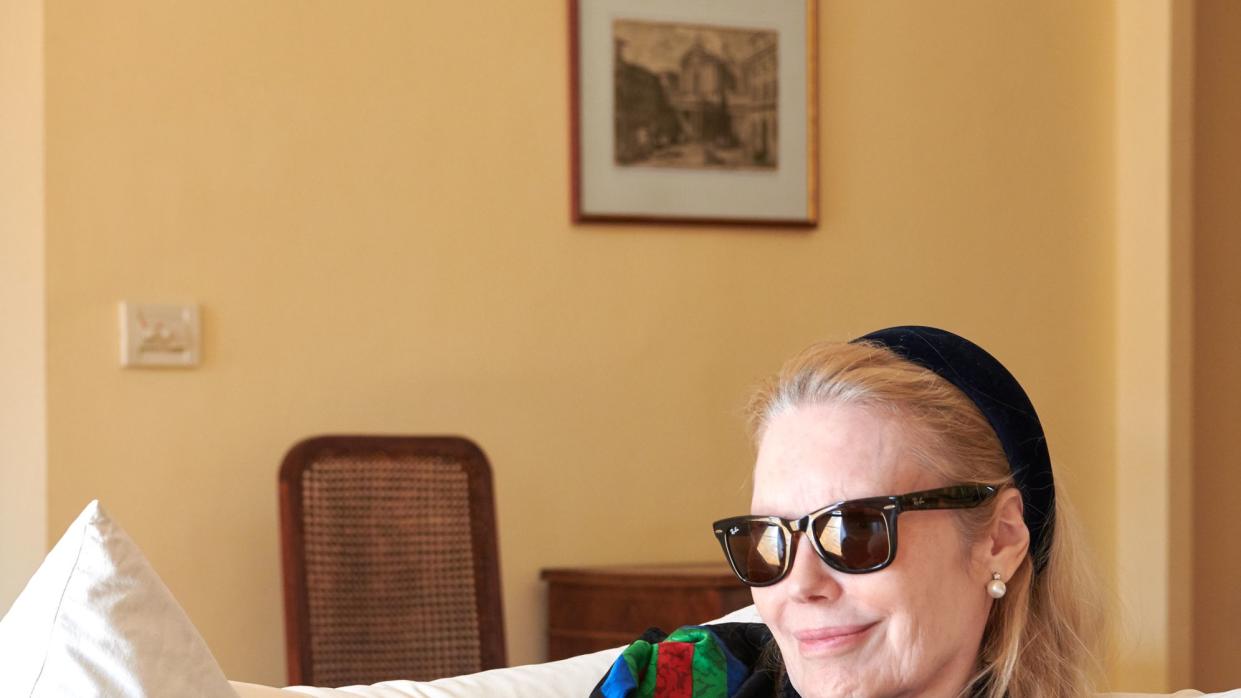
As they say in Italian, “Finita la commedia”: The farce has come to an end; the party is over. Or so it seemed in April 2023, when, on a balmy Roman morning, a squadron of carabinieri arrived at the Villa Aurora, a crumbling mansion in the center of the Eternal City with the world’s only known Caravaggio ceiling painting.
Their mission that day: escort off the premises its 74-year-old chatelaine, none other than the San Antonio–born Rita Boncompagni Ludovisi, née Carpenter, the former model, actress, and real estate agent who had refused to leave the property amid a bitter inheritance dispute with her three stepsons. Granted, this particular princess is no stranger to public spectacle.
She cannonballed into center stage in the 1980s, when, as the estranged wife of the late and disgraced Democratic congressman John Jenrette, who was indicted in the Abscam scandal, she posed naked for Playboy a few months before publishing her tell-all memoir, My Capitol Assets. This time the spectacle was humiliating. An Italian judge had issued an eviction order in January that was finally enforced, and in a country where you’re lucky if a call to the police results in a single officer biking over a couple of hours later, the principessa was treated like a high-security prisoner.
In front of the Villa Aurora, the family home of her third husband, Prince Nicolò Boncompagni Ludovisi, who died in 2018 and whose three sons had fiercely contested Rita’s claim to its ownership and her right to live in the house for the rest of her days, Princess Rita appeared in pearl studs, Ray-Bans, and a fur coat. She was given only 20 minutes to pack as much as she could.
“I feel like I’m in a surreal movie, like Sartre’s No Exit,” she said, though in truth the scene seemed more ripped from the pages of Tennessee Williams or The White Lotus. Rita’s main priority was to shepherd her four beloved bichons into a car—a regular taxi, not even an Uber Black. The courts had seized her vintage Mercedes, too.
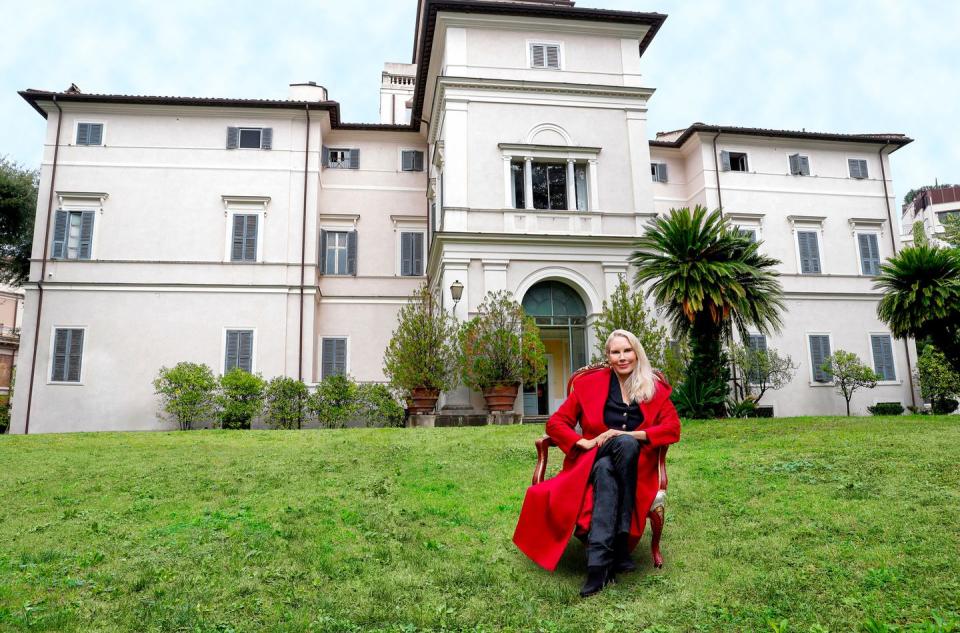
In the end it turned out that there was an exit for the princess—out the gate and left on Via Lombardia, out of the villa and onto the curb. Two years after T&C first paid her a visit, Her Serene Highness Princess Rita Boncompagni Ludovisi is broke and homeless, essentially couch-surfing, albeit on very well-appointed couches, and trying to figure things out. “I always had empathy for the homeless, but now I have personally experienced it, up close and personal,” she tells me. “I was in shock and I still am.”
This was not at all how her story was supposed to end. In 2003 Rita, then Rita Jenrette, a New York real estate broker, was called over to Rome to work on a project with an Italian prince. Coming from New York, where people styling themselves as nobles are not exactly uncommon, and their claims not easily verifiable, she says she was initially skeptical. But this alleged prince, Nicolò Boncompagni Ludovisi, was the real thing. Notwithstanding that Italy became a republic in 1946, Nicolò was the scion of an aristocratic family that had produced two popes and amassed a magisterial art collection. Rita and Nicolò fell in love and married in 2009. Rita was photographed two years later by the New Yorker wearing a tiara and sapphires, and the two were supposed to live happily ever after. But then Nicolò died, and the fairy tale became a nightmare.
Italian law guarantees widows the “right of use” of a dead spouse’s home, and this right normally would have applied to Rita, but the problem was that Nicolò, before he ever met her, had already given one-third of the property to each of his first two sons, Francesco and Ignazio. In light of that, Rita would have had to split the final third of the estate with Nicolò’s third son, Bante, who is married to Delphina Lapham, the daughter of the American publisher and Texaco heir Lewis Lapham. (Delphina and Bante did not respond to a request for comment.) Add to the mix that Nicolò’s second wife opened foreclosure proceedings on the villa, which did not sell during any of the multiple times it was put up for auction by the Italian government in 2022.
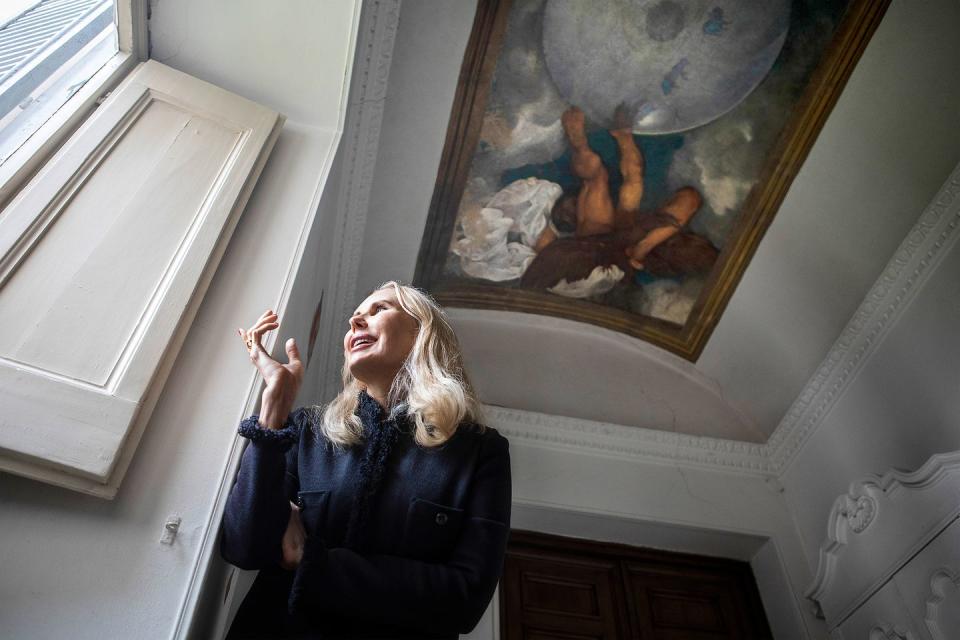
The Villa Aurora is embedded in the history of Rome. Immortalized by Henry James in his novel Roderick Hudson, the house is a gem of Renaissance grandeur. In addition to the famous Caravaggio ceiling painting, it has frescoes by Guercino and, on the lawn, a mysterious statue of the god Pan, attributed by German art historian Johann Winckelmann in the 18th century to none other than Michelangelo, a claim that art historians are currently investigating. Despite these treasures, the villa wasn’t able to find a buyer, at least not at the price of $500 million.
“It was being sold in the most insulting way possible,” says T. Corey Brennan, a classicist at Rutgers University who has worked with Rita for more than a decade on the preservation of the house’s archive, which includes letters from Louis XIV and Marie Antoinette, and of the Roman ruins (detected by radar) under its grounds, on land once owned by Julius Caesar himself. “It was on a judicial auction website, next to confiscated stuff from drug dealers. You’d see a used pair of Adidas for 10 euros, a rusty scooter for 50, and a Renaissance villa for 477 million.”
The Boncompagni Ludovisi family, in a momentary truce, managed to get the villa out of court control in February and was expected to put it on the market to private buyers. Until it sells, no heir can reside in the house, per the family’s rapprochement agreement. Rita needs the villa to be sold—desperately. “I put all my money, all my savings, all my inheritance into the Villa Aurora,” she says, referring to the renovations she and her late husband oversaw. “At this point I have no reserves. I have two outfits and two pairs of shoes.”
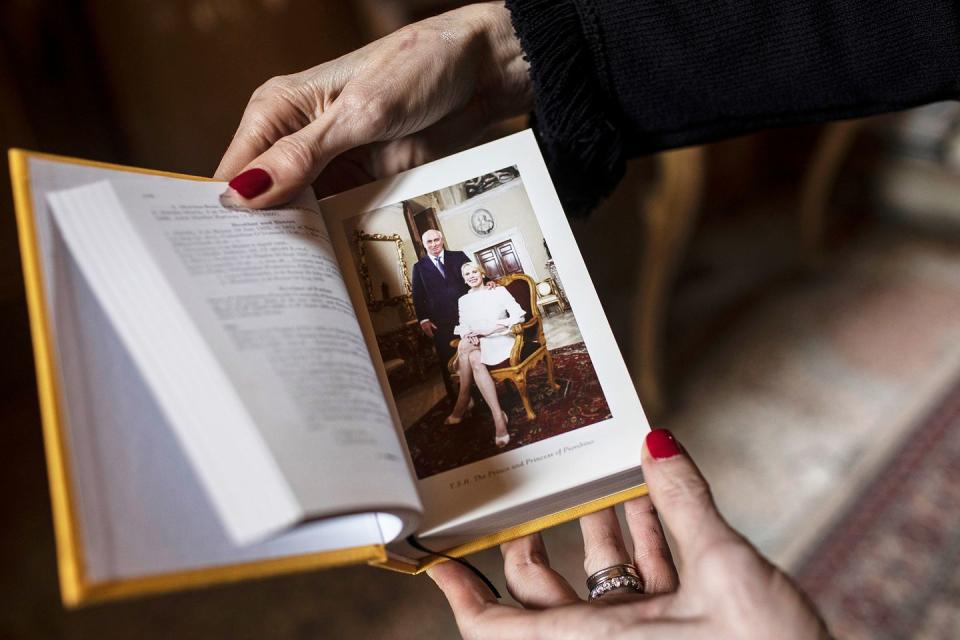
Rita’s first crash pad after her frantic exit from the Villa Aurora was another villa, in Cerveteri, on the outskirts of Rome, lent to her by another Roman royal outsider, Princess Pia Ruspoli, the winner of the 1968 Miss Sicily beauty pageant. Like Rita, she had a career in show business before marrying into the local aristocracy. Then Princess Dialta Alliata di Montereale and her husband Prince Vittorio immediately wired Rita some cash (no one will say how much). Dialta can likely relate to Rita’s fight for the Villa Aurora, as she has been involved in a decades-long court battle to claim half of the British collector Arthur Acton’s billion-dollar estate, on the grounds that DNA evidence has established that she is his granddaughter.
Things went awry almost from Rita’s first night in Cerveteri, where Princess Pia said she could stay for a week. For starters, only one of Rita’s four dogs, Joy, was allowed to join her—the other three were put in a nearby kennel. “My dogs were traumatized too,” Rita says. “They are like children to me.”
The princess, still reeling from the ordeal, fell and broke two ribs. Days later she was rescued again by two other friends, the Parisian antiques dealer Sylvain Lévy-Alban and his partner, design connoisseur Charlie Garnett. The two, who live in a magnificent Paris apartment decorated in collaboration with Jacques Garcia, had met Rita and Nicolò in Rome years before, and they became friendly through, of all things, Rita’s bichons. As Lévy-Alban tells it, the dogs are holy terrors and far from house-trained, even in advanced age. Garnett is a bit more forgiving. “They are absolutely adorable little people,” he says. Joy, the oldest, had a litter a while back; Lévy-Alban adopted what was supposed to be one puppy but was actually two. So when word came that the principessa had fallen on hard times (and hard floors), the two quickly mobilized to rescue the mother of their dogs, and their three brethren. Years earlier they had promised Nicolò that they would look after Rita if anything ever happened to her, and they were true to their word.
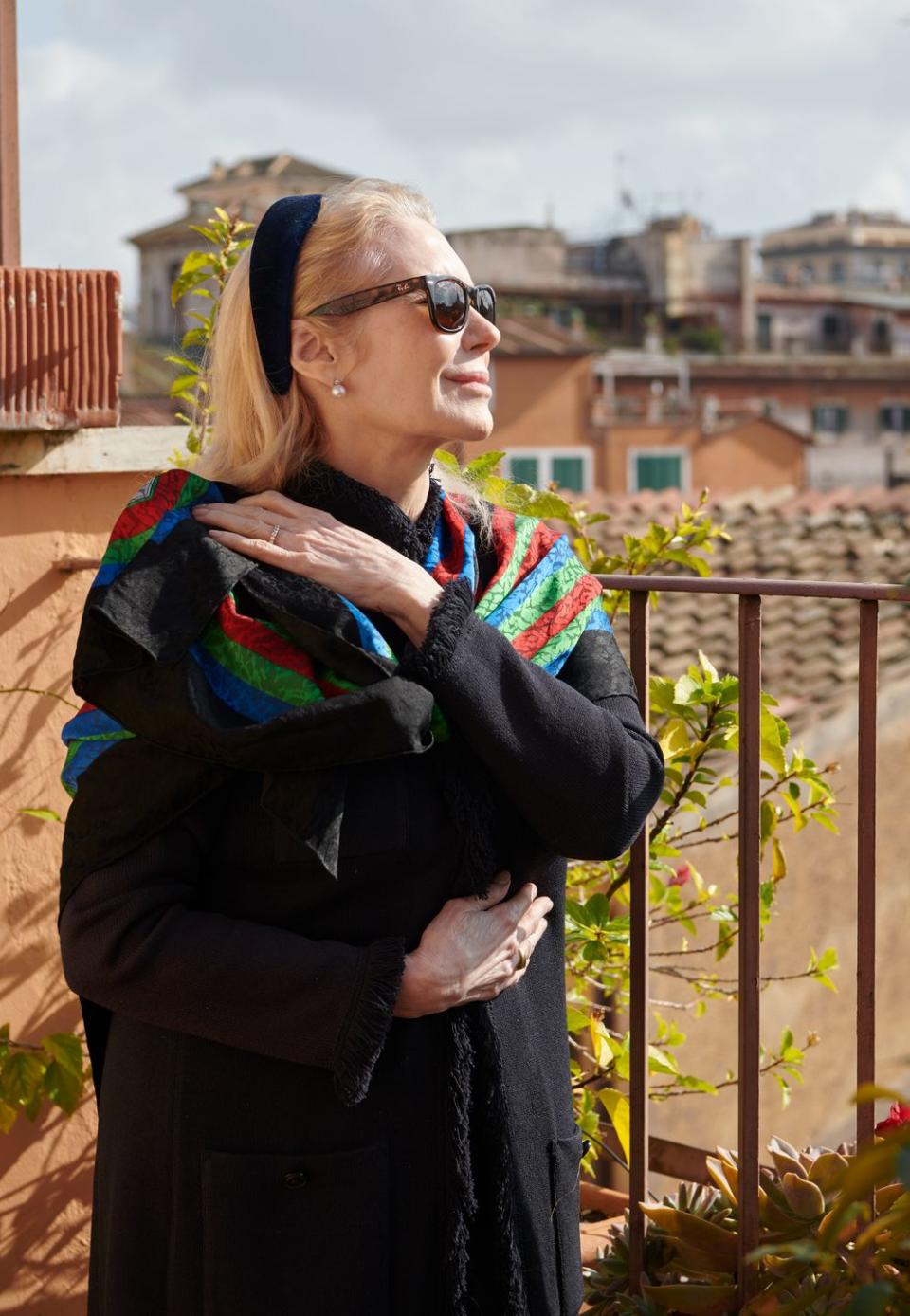
They drove 15 hours from Paris in Lévy-Alban’s old Audi to find her, collect her stranded dogs from the kennel, and bring them all back to France. When the two got to Cerveteri, they found a damsel in distress. “The poor woman went through appalling shock,” Garnett says.
“She has this habit of falling on staircases because she doesn’t eat anything,” Lévy-Alban says, noting that Rita had 15 pieces of luggage, which would not fit in his car. “She had broken something and was lying in this very glamorous way on a bed, with her dog barking and not being very friendly. We literally just picked her up.”
After the Audi drove back to Lévy-Alban’s country estate outside Paris, the princess had another fall—this one requiring the emergency room. “Though all the lights had been left on, and she had been told how to use them, she managed to fall on the staircase and break her clavicle,” Lévy-Alban says. “It was really pretty exhausting after the drive.” For Rita this was the low point: “I would not wish this experience on my worst enemy.”
Lévy-Alban and Garnett’s plan had been for Rita to stay in the country with her dogs while they went back to Paris, where they work. But because her broken clavicle rendered her incapable of doing anything, they needed to find somewhere else where she could be cared for full-time. Rita then went to stay with another old friend in Paris, albeit one who said she could not bring her dogs. She then went back to Italy, where she stayed for a while at a hotel before landing at the luxe Rome apartment of a prominent American lawyer. Then she had to move on yet again. Rita’s dogs, meanwhile, with the exception of Joy, are still living at Lévy-Alban and Garnett’s country estate, where they seem to want for nothing. “Having to receive someone with four dogs, superbly badly behaved dogs, is not nothing,” Lévy-Alban says.
For Rita, life after the Villa Aurora has been a testament to her friendships. “I keep thinking, What if I didn’t have the friends I have? I’d be on the street—that’s all,” she says. She grows reflective when we last speak, and vows to devote herself to community service—if and when the estate is ever sold. “When I have this money I’m going to do something for the homeless. It’s one thing to have empathy; it’s another thing to really experience it.”
This story appears in the April 2024 issue of Town & Country, with the headline "The Couch-Surfing Principessa." SUBSCRIBE NOW
You Might Also Like

 Yahoo Movies
Yahoo Movies 
